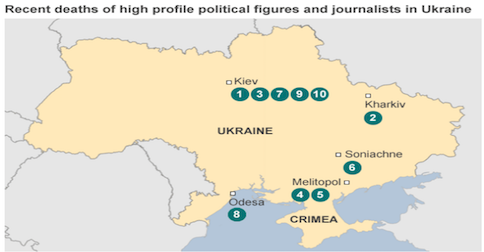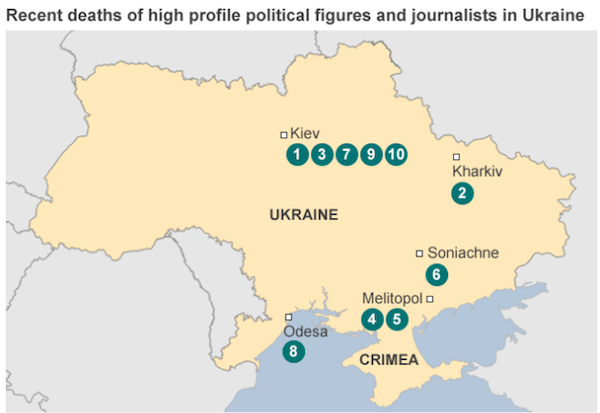
Mysterious deaths under strange or unusual circumstances seem to unfortunately go hand in hand with politics, politicians, and political parties. Just recently, YourNewsWire reported on the laundry list of deaths connected to the Clinton family.
It seems these strange happenings are not endemic to just the United States of America. Almost a dozen high-profile people connected to the former Ukrainian President Viktor Yanukovych have died in strange and rather mysterious circumstances in the past few months – one right after the other – and it is beginning to rise eyebrows not just in Europe, but across the globe.

BYPASS THE CENSORS
Sign up to get unfiltered news delivered straight to your inbox.
You can unsubscribe any time. By subscribing you agree to our Terms of Use
Latest Video
The BBC reported recently:
The killings of two public figures in the Ukrainian capital Kiev only deepens a mystery surrounding a recent spate of deaths among people linked to the political machine of former President Viktor Yanukovych.
In the last three months, at least 10 people who served in his government or in his Party of Regions (POR), or had connections to people who were, have met premature ends either by being murdered or reportedly committing suicide.
In January, Mykola Serhiyenko, the former deputy chief of Ukraine’s national railways, was found shot dead in his Kiev home, with the gun lying beside him. Then came a string of others, inluding Olexiy Kolesnyk, the former governor of the Kharkiv region, who was found hanged, and Mykhailo Chechetov, who jumped from his 17th-floor apartment in the capital.
The most recent deaths took place within hours of each other. On Wednesday evening, Oleg Kalashnikov, a former MP from Mr Yanukovych’s party, was found dead from gunshot wounds in his apartment block.
Then on Thursday, around lunchtime, two masked assailants gunned down Oles Buzyna, a writer and former newspaper editor, in the courtyard of his building.

1. Oleh Kalashnikov, MP of Party of Regions (POR), gunshot, presumed murder
2. Olexiy Kolesnyk, former governor of Kharkiv region, hanged
3. Stanislav Melnyk, gunshot, possible suicide, POR member
4. Serhiy Valter, former mayor of Melitopol, hanged
5. Olexandr Bordiuh, deputy chief of Melitopol police, found dead, “hypertension”
6. Olexander Peklushenko, former governor of Zaporizhia region, gunshot
7. Mykhailo Chechetov, former POR deputy chairman, jumped to death
8. Serhiy Melnychuk, former Odesa prosecutor, pushed/fell/jumped to death
9. Mykola Serhiyenko, former first deputy chief of Ukrainian railroads, gunshot
10. Oles Buzyna, a very provocative pro-Russian journalist and writer, gunshot
All were said initially to be suicides, except 1, 5, 8 and 10.
It may be that not all of these deaths are connected. But the sheer number of fatalities in such a short period of time, as well as the many unexplained details, such as why so many appear to be suicides, have led many observers to see some sort of link.
The problem is, no one has any hard evidence. And the theories about what connects the deaths often seem to reflect the commentators’ political position.
Those from former President Yanukovych’s circle say the authorities are conducting a “witch hunt” against them, threatening them with what they say are unjust prosecutions and long jail sentences, which have driven a number of people to take their lives out of despair.
Government officials say the criminal cases, for extortion, corruption and even murder, are justified. The suicides, they say, are a reflection of the former officials’ feeling of guilt, and recognition that they cannot avoid punishment.
Others whisper darkly that an outside force could be killing off the former Yanukovych insiders, to keep them from talking.
Again, however, no one can provide any concrete proof that this is in fact the case.
Media reaction in Ukraine:
Journalist Vitaly Sych: “Looks like someone needs evidence that anti-Russian sentiment is rampant in Ukraine, and someone is creating this evidence.”
Journalist Sonya Koshkina: “Excuse me, police, but where have you been looking? How can people get killed in Kiev just like that, in broad daylight?”
Media expert Natalya Lihachova: “We are drowning in a nightmare and chaos. Everyone was expecting Russia to resume military hostilities in eastern Ukraine, but the nightmare has come to Kiev.”
Journalist Vakhtang Kipiani: “This is a dish cooked exclusively for consumption in Russia. It was not enough to brand [the Ukrainian government] fascists. The junta must kill its political opponents. The jigsaw puzzle is now complete.”
In what may or may not be a related development, local media reported that Kalashnikov wrote a letter, complaining he had received threats for his public calls to mark the 70th anniversary of the allied victory in World War Two.
The authenticity of the letter could not be verified. However, a website does exist called “Peacekeeper”, which Kalashnikov wrote about.
The site listed his address with this entry: “Separatist. Provocateur. Accomplice of militants. Maintains contacts with terrorists and militants.”
In the case of the murders of Kalashnikov and Buzyna, though, authorities were quick to announce a link.
Initially, after the discovery of Kalashnikov’s body, Anton Gerashchenko, a high-level advisor to the interior ministry, wrote on his Facebook page that law enforcement investigators were looking into five possible motives, including his business interests and “political activities”.
Ukraine’s authorities have been criticised for their work in other investigations
But after Buzyna was gunned down, Mr Gerashchenko announced the murders were connected to the two men’s knowledge of the pro-Yanukovych “anti-Maidan” protest movement, which took place at the same time as the mass demonstrations that drove Mr Yanukovych from power, and which officials are now investigating for alleged criminal acts.
“It appears that the shooting of witnesses in the anti-Maidan case continues,” Mr Gerashchenko wrote.
However, he did not say why he had reached this conclusion so quickly, or what evidence he had to back up the claim.
Ukraine’s law enforcement bodies’ work on other cases has come under sharp criticism.
The Council of Europe, the continent’s main human rights body, said an investigation into the deaths of protestors and policemen during the anti-government protests last year showed “serious deficiencies” and failed to satisfy “requirements of the European convention of human rights”.
Ukrainian officials for their part called the criticism “surprising and baseless”.


